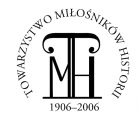Code of Ethics
The editors of Przegląd Historyczny accept only original submissions, that is original material prepared in accordance with the principles of scholarly ethics (cf. e.g. Code of Ethics of the Polish Historical Society, chapter II: Historical research and presentation of its results, Przegląd Historyczny, CXIII, 2022, 3, pp. 611–613), unpublished in any written form either previously or concurrently.
In view of the above, an author submitting a text for publication in Przegląd Historyczny should not:
submit their work to other journals at the same time (this applies also to other language versions of the submission);
seek to publish an editorial variant of a previously published (including electronically) work, if they do not formulate new conclusions and interpretations in it or present new sources in it;
submit a text that, not long after the submission, would become, with minor changes, a chapter in a monograph.
If the argumentation contained in the submission has been previously published in any way (including presented orally), the author is obliged to indicate the form of this publication or its circumstances in a footnote.
If the text submitted for publication has been written by more than one author, the submission should include information on the contribution of each author with regard to its percentage or kind.
It is unacceptable for authors to plagiarise, that is, to violate intellectual property rights by appropriating someone else’s ideas, works, research results, including source findings and information (for example, heard during public presentations). The editors will inform the institution employing the author of each instance of plagiarism and intellectual property infringement detected.
The editors of Przegląd Historyczny do not tolerate the practices of the so-called ghost writing (submitting texts written by another author as one’s own) and guest authorship (listing persons who made no significant contribution to its creation as authors of a submission). Such submissions will be rejected by the editors.
Authors are obliged to inform the editors of all potential or actual conflicts of interest known to them. A conflict of interest is a situation in which personal, financial or institutional links negatively affect the work of an author, editor or reviewer, that is, when they hinder or prevent them from acting in accordance with the best ethical practices of a scholar.
Authors are obliged to indicate sources of public funding for their research, if applicable.
Authors are obliged to accept the above code of ethics in a declaration sent with the text submitted for publication.

